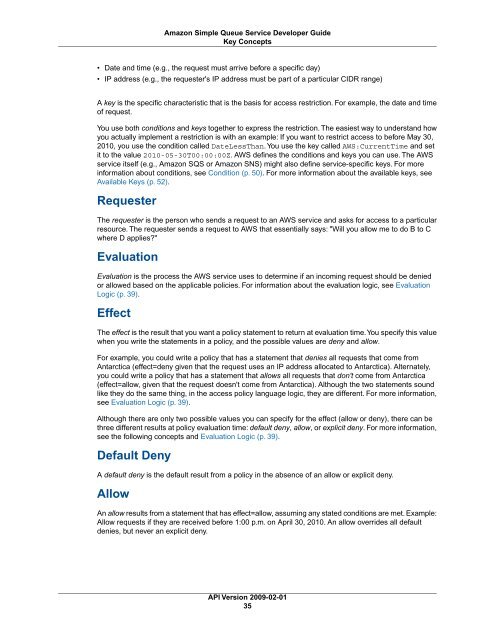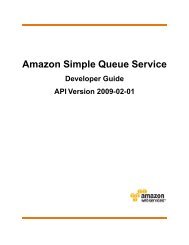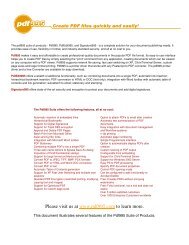sqs-dg
sqs-dg
sqs-dg
You also want an ePaper? Increase the reach of your titles
YUMPU automatically turns print PDFs into web optimized ePapers that Google loves.
Amazon Simple Queue Service Developer Guide<br />
Key Concepts<br />
• Date and time (e.g., the request must arrive before a specific day)<br />
• IP address (e.g., the requester's IP address must be part of a particular CIDR range)<br />
A key is the specific characteristic that is the basis for access restriction. For example, the date and time<br />
of request.<br />
You use both conditions and keys together to express the restriction. The easiest way to understand how<br />
you actually implement a restriction is with an example: If you want to restrict access to before May 30,<br />
2010, you use the condition called DateLessThan. You use the key called AWS:CurrentTime and set<br />
it to the value 2010-05-30T00:00:00Z. AWS defines the conditions and keys you can use. The AWS<br />
service itself (e.g., Amazon SQS or Amazon SNS) might also define service-specific keys. For more<br />
information about conditions, see Condition (p. 50). For more information about the available keys, see<br />
Available Keys (p. 52).<br />
Requester<br />
The requester is the person who sends a request to an AWS service and asks for access to a particular<br />
resource. The requester sends a request to AWS that essentially says: "Will you allow me to do B to C<br />
where D applies?"<br />
Evaluation<br />
Evaluation is the process the AWS service uses to determine if an incoming request should be denied<br />
or allowed based on the applicable policies. For information about the evaluation logic, see Evaluation<br />
Logic (p. 39).<br />
Effect<br />
The effect is the result that you want a policy statement to return at evaluation time.You specify this value<br />
when you write the statements in a policy, and the possible values are deny and allow.<br />
For example, you could write a policy that has a statement that denies all requests that come from<br />
Antarctica (effect=deny given that the request uses an IP address allocated to Antarctica). Alternately,<br />
you could write a policy that has a statement that allows all requests that don't come from Antarctica<br />
(effect=allow, given that the request doesn't come from Antarctica). Although the two statements sound<br />
like they do the same thing, in the access policy language logic, they are different. For more information,<br />
see Evaluation Logic (p. 39).<br />
Although there are only two possible values you can specify for the effect (allow or deny), there can be<br />
three different results at policy evaluation time: default deny, allow, or explicit deny. For more information,<br />
see the following concepts and Evaluation Logic (p. 39).<br />
Default Deny<br />
A default deny is the default result from a policy in the absence of an allow or explicit deny.<br />
Allow<br />
An allow results from a statement that has effect=allow, assuming any stated conditions are met. Example:<br />
Allow requests if they are received before 1:00 p.m. on April 30, 2010. An allow overrides all default<br />
denies, but never an explicit deny.<br />
API Version 2009-02-01<br />
35










